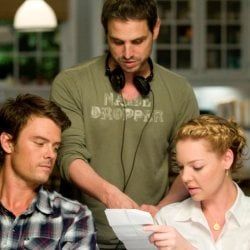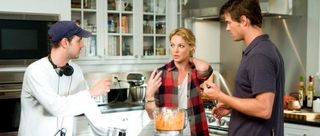Exclusive Interview: Life As We Know It Director Greg Berlanti

When it comes to Hollywood screenwriters, Greg Berlanti is neither fish nor fowl. He made his name producing and writing TV shows like Everwood and Brothers And Sisters, made his directorial debut with the gay romantic comedy The Broken Hearts Club, which makes him the romantic comedy guy. But he's also one of the writers behind the forthcoming Green Lantern movie and its potential sequels, plus a Flash movie and Clash of the Titans 2-- that makes him the genre guy, right?
Berlanti is happy to say he's both, and though his new film Life As We Know It is very much in the romantic comedy scheme of things, he readily points out that the central challenge of movies like this one and Green Lantern is the same: you've got to make people believe in the world you've built. In the case of LIfe As We Know It, it's a slightly polished romantic comedy world in which unlikely duo Holly (Katherine Heigl) and Messer (Josh Duhamel) are left with the duty of raising a baby after her parents, their mutual best friends, die in a car accident. They move into their friends' spacious house and take over all the duties of parenting, with predictably disastrous results.
Because this is a romantic comedy you kind of know where things will go from there, but Berlanti told me he worked hard to keep things unexpected, from surrounding Heigl and Duhamel with rich side characters to letting reality slip in from time to time. Check out what he had to say about the film, the other half of his life writing superheroes, and how he plans to improve Clash of the Titans 2 in the exclusive interview below.
I really like romantic comedies, and people don't take them that seriously these days.
There is romantic comedy fatigue, I think.
Yeah, and you're taking the romantic comedy formula and really immersing yourself in it. Can you talk about your commitment to it?
For me, the romantic comedies I love are the ones that pay homage to the genre, but also find their ways to twist it and tweak it. Most recently the Working Title romantic comedies, the ones out of London, Notting Hill or Four Weddings and a Funeral, where there's a bevy of smart characters around our couple to keep it fresh and alive. Yes, you're still sort of following the beats and aware that there may be a race for a loved one, but how can you twist that? [In Like As We Know It] the death of the parents, when I read the script initially, took me by surprise. It had this element of, OK, we're in a real world, we don't have to be in a fake one. The world in the film allows for all tones, and allows for it to go to sad places and happy places, and they can co-exist. i guess that authenticity is what i look for when I see a movie or watch a movie or read a script, something that feels real.
CINEMABLEND NEWSLETTER
Your Daily Blend of Entertainment News
At the same time it's a very polished world. No bakery looks as appealing as the bakery Holly owns. It's got that sheen to it that romantic comedies have had going back to the 30s.
Absolutely. But it's always, what do you balance it with? What's on the other side of that. Hopefully in the dialogue of the fight, or the way they communicate, you have those uber-real moments. I hope it's a real connection between the characters with a heightened world. There's no doubt there's a heightened world around it. We knew we were going to spend 60% of the movie in this house, and we didn't want the audience to feel claustrophobic. We wanted it to be spacious and have room, so we have room to move the camera and it becomes its own kind of character. At the same time we wanted to address in the material, how did they get this house? How are they going to pay for a house like this? And is that going to be one of the things, are they going to be able to keep the house like this over the course of the movie? And how much messier does it get as the baby runs along?
Is that something that you take with you from television, the importance of sets?
Absolutely. It becomes a character in the piece, and you want to differentiate it in its own way. And yeah, I definitely think it all sort of creates an atmosphere, hopefully, where you can fuse all of those emotions together. I do think why audiences sort of feel some fatigue is both in predictability and also things being just too polished. or if it's going to be sweet, it's just sweet or just schmaltzy. If it's going to be comedy, it's just broad. The best ones have a combo platter of all these things.
You have these two main characters who have really unappealing aspects to them. You're not afraid of actually exposing their flaws.
That also comes out of TV. You try to cast against that. Again, for me it's always being mindful of what's the other side of something. I think most people feel flawed and have their moments, and the more real that they feel, that those characters feel, the more we're able to identify with those characters. If they do feel too clean and polished, and there's no unlikeablity at all, I distance myself then from that kind of film, and I don't feel involved.
Katherine Heigl has done a good job of establishing a kind of niche, a kind of character she usually plays, and Holly fits right into that. Did she have a role in building the character?
Yes. She was also at the point in her career where she could get this kind of movie made. She liked the character ,and we worked on it once we knew when we were making it. She felt like this was the most similar to her. It was interesting, she had just adopted a baby, and she had come down to the set. Babies in general, they're just so immediate that they force that immediacy in a lot of the scenes. They sort of require everyone's attention. You have to be in the moment. I think that allowed for people to kind of play themselves at times. I think Josh brought that out in her too, and her him. The combination of the baby and each other, it was more about just trying to capture their dynamic as people, and who they were as individuals and who they were together.

You've got more baby in this than you ever see in movies.
Well, we had triplets. People bail because it's too tough! It's a logistical nightmare. What time does this baby eat, what time does that baby sleep, which baby's better for the crying scene.
They ruin take after take.
And they do. So a lot of times I would leave a second or third camera just rolling and start to set up the next scene and go back and get the baby scenes. you want a real reaction so it feels like a real person in the house.
And you've got baby acting in this, which is so unusual. That's got to be all in the editing.
Some of it's editing, but some of it was tactics on the day, of who does this baby like the most? One baby really took to Katie, and one baby really took to Josh, so you try to schedule. We all took turns singing to the baby between takes, or holding the baby, so it felt like a familiar surrounding for the kid. There are all different ways to coax it out. I'm not sure if it's called directing; I think it's called babysitting.
Would you ever direct a baby again?
I don't think I would do a film that had a predominant baby in it again, unless there were a lot of other things going on in the movie. I'm not sure I'd have a baby after this! But it's a lot of fun.
You're firmly planted in this superhero world writing the Green Lantern movies, but you're also making this romantic comedy. What do you like about both worlds and kind of being between them?
Because of character, and they're both heightened worlds, but they both need something real that grounds them or we don't connect to them emotionally. I like that dynamic. It allows for something to feel inherently more dramatic. Someone is being whisked away into outer space, or a baby is landing in two characters' laps. What do you do to make that feel possible? It's sort of a campaign to the audience, so that by the end the audience is going, 'You know, I believe that that can happen. That felt genuine.' It's a similar task in both genres to a certain extent. There's fatigue in both genres. Coming up with ways to make those things fresh, and approaching them as, if I were an audience member, what would I want to see right now? How can we circumvent that or surprise them or make it a bit richer than it would ordinarily be.
For Clash of the Titans 2, are you trying to add more character to kind of combat the flaws from the earlier film?
Absolutely. It's, what would we still want to see? What worked about the first film, and we ask ourselves what didn't work about it, and how can we do more of what worked? We do that all the time on TV. You have a junk episode, and it's like ugh, but you end up learning so much more about it, and the great ones couldn't exist if you didn't have the ones that weren't as strong. Sometimes that helps you make the next one better.
Staff Writer at CinemaBlend
Most Popular




